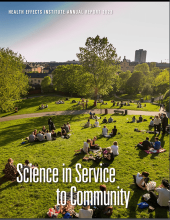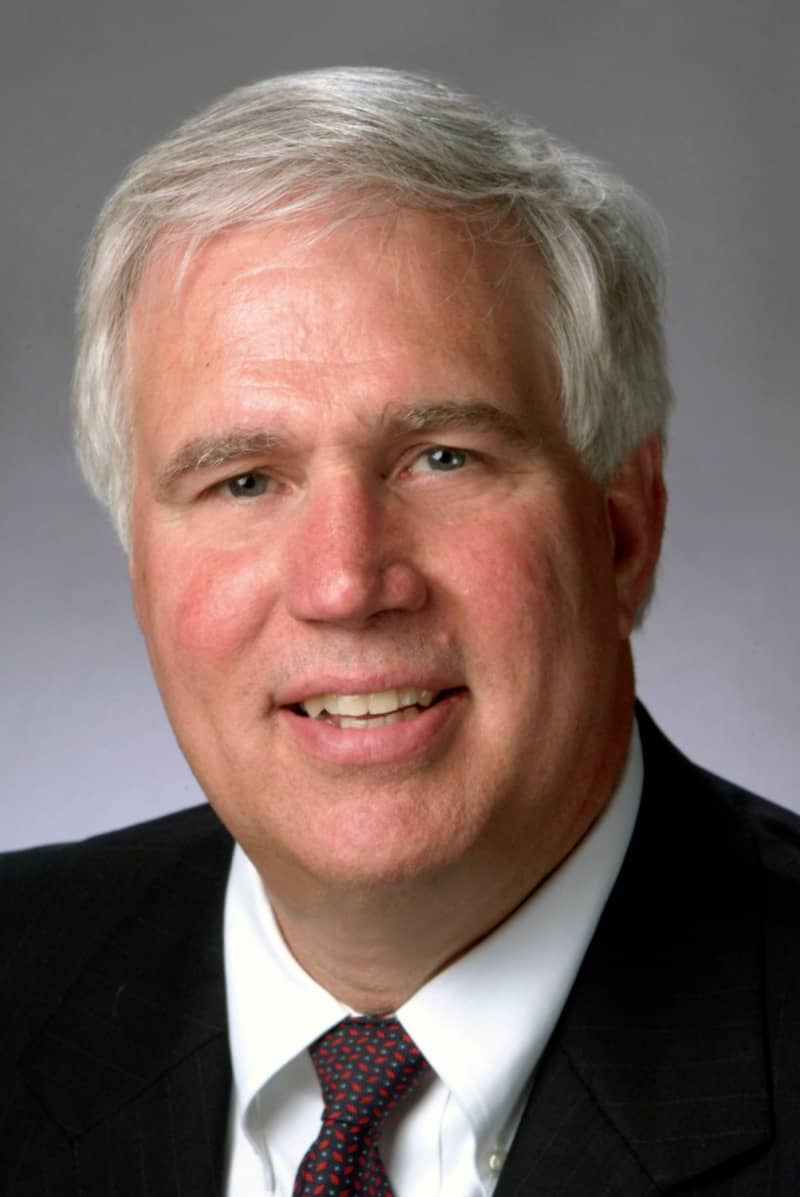
Even as we celebrate new advances and insights, we know that science is never “finished.” Challenges constantly emerge; the quest to understand our world spans generations. To empower tomorrow’s scientific leaders, HEI creates mentorship and funding opportunities for students and early-career scientists to pursue meaningful research on the health effects of air pollution. By investing in promising new researchers, we strengthen the next generation’s capacity to ask and answer vital questions that we can only imagine today.
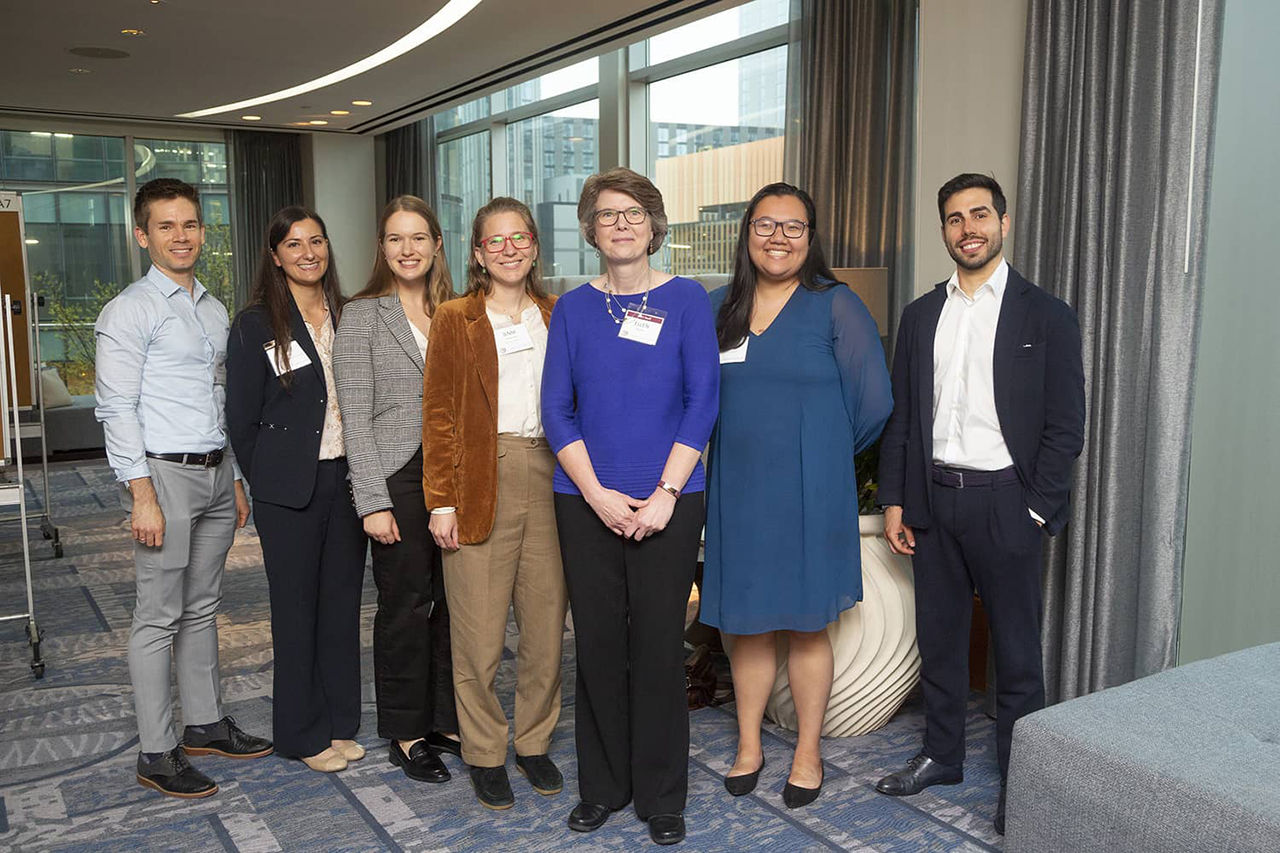
Recipients of the 2023 Jane Warren Award with HEI Director of Science Ellen Mantus.
A gathering known for its combination of cutting-edge science and collegiality, HEI’s Annual Conference is an ideal venue for emerging researchers to share their work and exchange ideas with the broader scientific community. The prestigious Jane Warren Conference Award is presented each year to six applicants whose research abstracts align with HEI’s mission to provide high-quality and impartial science on air pollution and related health effects. Winners are invited to present a poster and lightning talk on their research at the conference. The 2023 awardees presented on innovative machine learning techniques and air cleaning technologies, racial and ethnic disparities in pollution exposure and impacts, short- and long-term health impacts of pollution exposure, and opportunities for using data to prioritize air pollution interventions.
The Walter A. Rosenblith New Investigator Award, established in 1999, has helped jump-start the careers of many new scientists. Each award provides three years of funding for an investigator at the assistant professor or equivalent level to pursue research relevant to HEI’s interests. Rosenblith investigators have published more than 30 studies to date, including Manabu Shiraiwa, whose HEI study Chemical and Cellular Formation of Reactive Oxygen Species from Secondary Organic Aerosols in Epithelial Lining Fluid was published in early December 2023. Also during the fall, HEI selected two new Rosenblith awardees, Rachel Nethery of Harvard University and Yoshira Ornelas Van Horne of Columbia University.
HEI’s new Summer Fellowship program had a highly successful start in 2023. Launched in collaboration with the International Society of Exposure Science and the International Society for Environmental Epidemiology, with additional support from the Burroughs Wellcome Fund and other donors, the program pairs established environmental health researchers with undergraduates from backgrounds that have historically been underrepresented in the field. In its inaugural year, the program awarded seven students $6,500 each to spend 10 to 12 weeks of their summer gaining direct experience in laboratory and departmental research activities. Following this impressive launch, planning is now underway for the 2024 Summer Fellowships.
Consistent and sustainable progress toward HEI’s diversity, equity, and inclusion (DEI) goals has been a driving intention throughout 2023. The success of the 2023 Summer Fellowship program is a milestone in HEI’s ongoing commitment to creating equitable pathways into the environmental health sciences. Internally, too, we reflect these values by thoughtfully maintaining an organizational culture where all staff feel a sense of equity and belonging.
A central goal of this initiative is to empower staff to incorporate DEI principles into their work by identifying and sharing resources, providing regular learning opportunities, maintaining a central record of DEI-focused work throughout the organization, and helping to prioritize DEI activities across all its departments.
In 2023, the DEI Committee, which consists of five staff members representing HEI’s science, administrative, and communications departments, continued its focus on evaluating internal policies and procedures as well as developing a 2024 HEI DEI Plan.

Yoshira Ornelas Van Horne
Columbia University
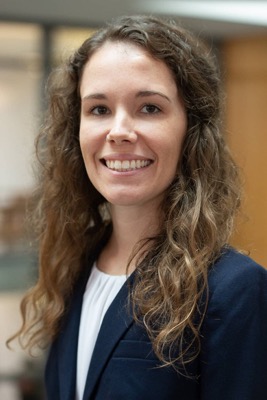
Rachel Nethery
Harvard University

Steps in building HEI's Strategic Plan.
In a complex world with myriad competing priorities, HEI puts public health front and center to focus on what it does best: delivering high-quality, impartial science relevant to the pressing environmental decisions facing humankind.
Our work is guided by a comprehensive strategic research plan, developed every five years, that lays out a cohesive vision for HEI’s programs. As we approach the close of the current cycle and begin the process of developing the 2025–2030 Strategic Plan, we’re reflecting on progress made while looking ahead at the evolving priorities for HEI’s sponsors and the scientific community. We’re also soliciting feedback from our sponsors on the research priorities to inform our work moving forward.
The current (2020–2025) strategic plan outlines four key priority areas for HEI: accountability research to test the links between air quality interventions and health; complex questions for the air pollution mixture; global health; and transport and urban health. Targeted and cross-cutting initiatives are advancing progress in all of these important areas. The HEI Energy program complements this work with a focus on understanding community impacts from oil and gas development.
Funding studies and convening experts are two primary ways that HEI supports scientific progress and facilitates science-informed decision making. For example, a Request for Applications issued in early 2023 will fuel a new wave of investigations into the health effects of long-term exposure to traffic-related air pollution. Funded studies will build upon novel and improved methods to evaluate exposure in the context of a shifting mobility landscape, including changing technologies and fuels as well as inroads toward electrification. Under another initiative, 2023 saw the launch of two new studies on the health effects of non-tailpipe emissions, including those from the use and wear of brakes and tires.
HEI’s Environmental Justice (EJ) program has begun soliciting applications aimed at identifying ways to reduce environmental health inequities, and it has carried out initiatives to incorporate concepts of equity and justice into HEI’s scientific activities.
Events convened by HEI in the past year, including major workshops in the United States and Europe, have been instrumental in translating scientific insights into policy-relevant discussions and decisions, such as proposed revisions to the European Union's Ambient Air Quality Directive.
A session at HEI’s 2023 Annual Conference, building upon our major review of the literature published in 2022 and other recent developments, brought mobility to the forefront. Experts discussed how environmental, social, behavioral, and other factors interact to influence traffic-related air pollution and its health impacts.
HEI also co-hosted a workshop in Nairobi to review current data on air quality and associated health effects in East Africa and to identify strategies for technical collaborations. In addition, continuing its engagement in South Asia and longstanding accountability work, HEI initiated a study to quantify the impact of India’s National Clean Air Program on air quality across major cities.
In meetings that we host and cosponsor, government officials, industry representatives, and scientists learn from HEI’s work and each other as they consider research priorities and continental-scale policy changes. Here are two recent examples.
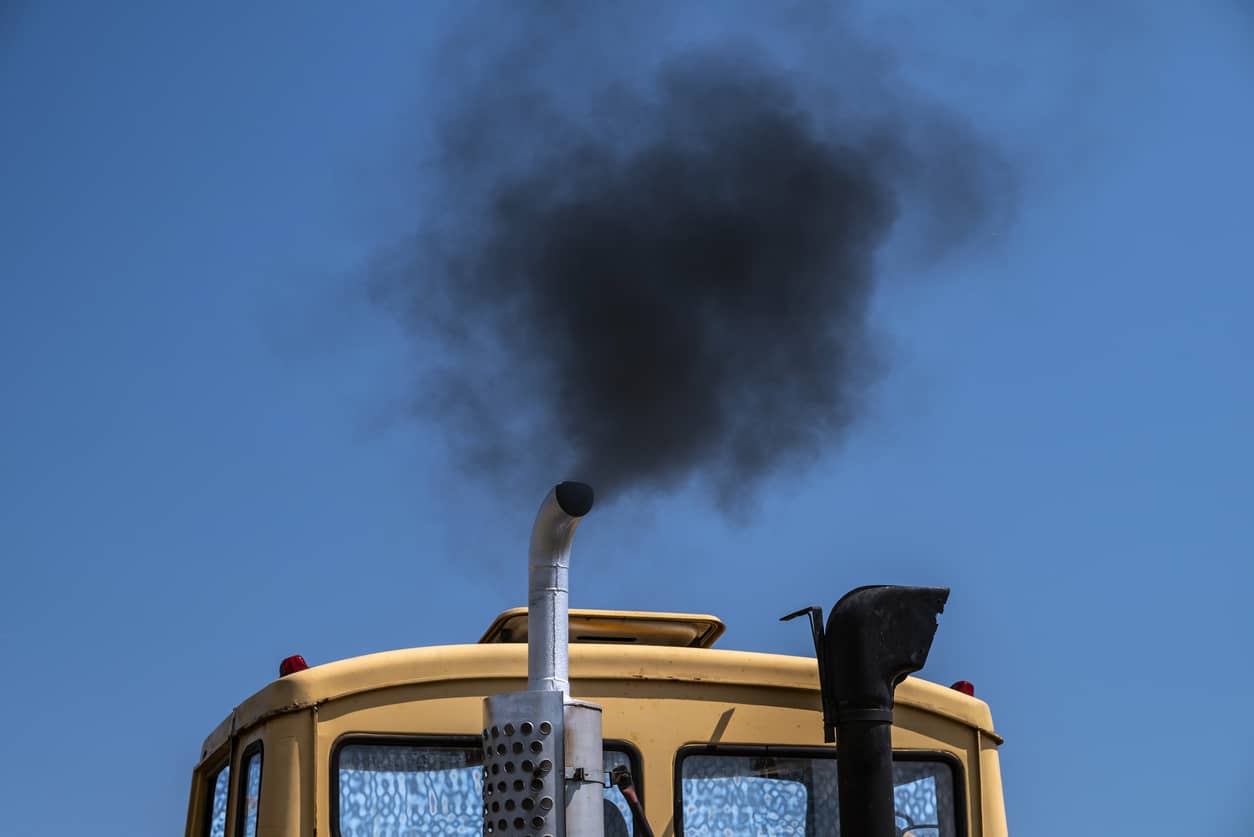
It is well established that exposure to particulate matter (PM) air pollution contributes to millions of premature deaths each year. Recent studies by HEI and others have detected PM health effects at doses previously considered too low to affect health. Yet the toxicity of this widespread pollutant varies by source, composition, and size — complicating efforts to pinpoint which sources are most harmful and inform interventions and regulatory standards. At the same time, many PM sources are in a state of flux amid technological, economic, and environmental changes.
In 2024, HEI will embark on an ambitious new effort to refine understanding of PM health effects against this changing landscape. To begin to scope this new research program, HEI gathered 40 experts from academia, industry, and government for a two-day workshop in December 2023. Alongside an international array of scientists, participants hailed from the U.S. Army Corps of Engineers, Department of Defense, National Institute for Environmental Health Sciences, California EPA and California Air Resources Board, and the Dutch National Institute for Public Health and the Environment, as well as from HEI sponsors including EPA, Cummins, ExxonMobil, Manufacturers of Emission Controls Association, and Toyota. Participants explored research needs and priorities surrounding the biological plausibility of health effects at low-dose exposures, the complexities of assessing health impacts of outdoor air pollution when indoor environments can modify personal exposures, the long-term health effects of episodic air pollution events such as wildfire smoke, and questions around emerging particulates such as brake and tire wear and microplastics. Based on the priorities identified at the workshop, HEI staff and research advisors will collaborate to develop a request for applications and share a vision of future PM research needs with the broader scientific community.
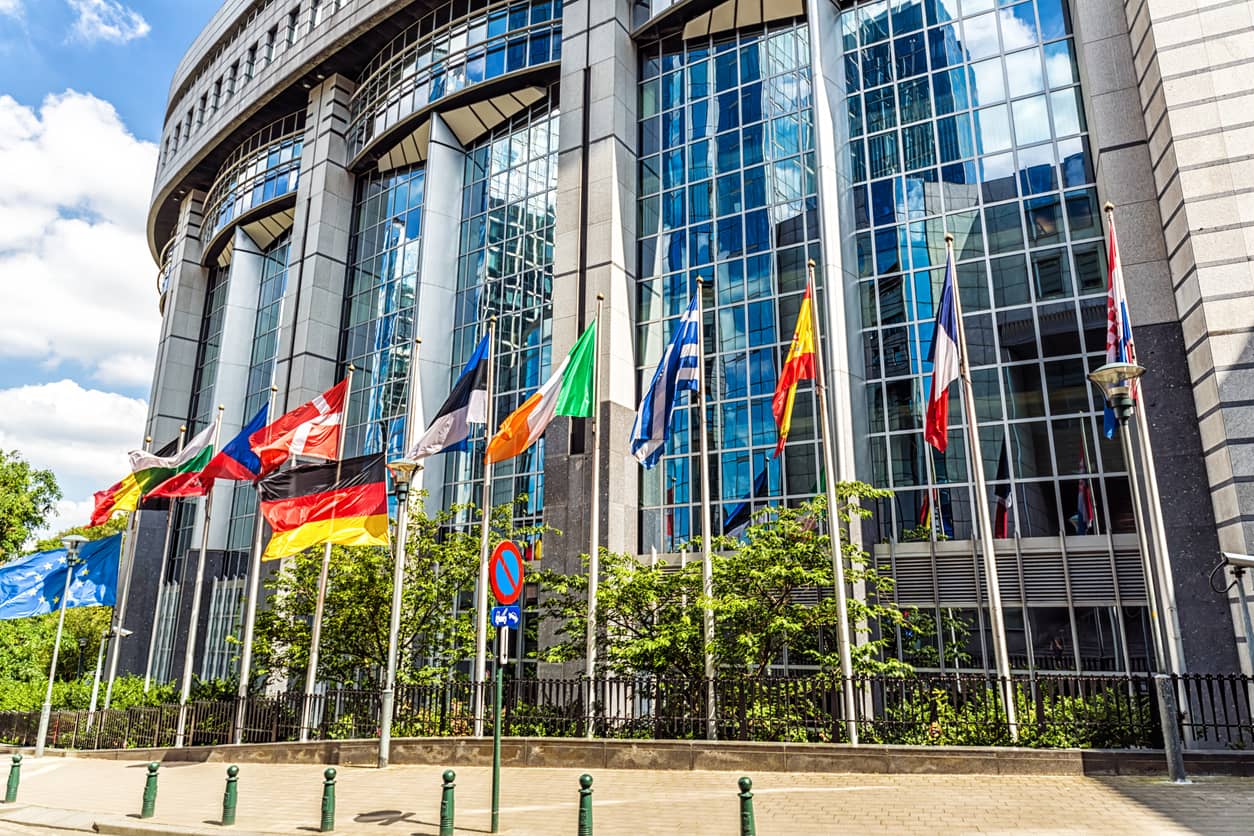
The Ambient Air Quality Directive (AAQD) is a major European law setting limits on air pollutants. In early 2024 the European Parliament and European Council reached a provisional political agreement on a proposal to tighten the AAQD with the aim of providing important benefits to public health. The proposal calls for lowering annual limit values for fine particulate matter and nitrogen dioxide across the EU by 2030 and full alignment with the 2021 World Health Organization (WHO) Air Quality Guidelines by 2035.
A trio of HEI-funded studies have played a significant role in helping to inform Europe’s deliberations over air quality. They were conducted as part of a comprehensive HEI research initiative to investigate the health effects of long-term exposure to low levels of air pollution in Europe, Canada, and the United States. Their findings were in the spotlight at a meeting that HEI co-hosted in May 2023 with the European Respiratory Society and the International Society for Environmental Epidemiology. EU and WHO officials joined leading scientists for the daylong event in Brussels, Belgium, to discuss scientific and policy questions relevant to the proposed AAQD revisions. (A workshop summary appears in the European Respiratory Journal.)
Everyone has a stake in clean air. But some communities have been left out of the processes through which decisions affecting air quality are carried out. In the United States, historically marginalized populations often suffer disproportionate environmental exposures and health impacts as a result of this legacy of exclusion and discrimination.

In fall 2022, HEI hosted a workshop in Atlanta, Georgia, where scientists, community leaders, and others shared knowledge and identified best paths forward for HEI’s environmental justice efforts.
Environmental justice (EJ) demands the fair treatment and meaningful involvement of people directly impacted by activities that affect their environment. To move toward addressing historic injustices and the needs of communities overburdened by environmental pollutants, HEI has launched a suite of new research and programmatic initiatives aimed at promoting equity. As part of these efforts, HEI supports community-engaged research that delivers meaningful science with meaningful solutions.
A new Advisory Council and Oversight Panel guide and oversee HEI’s EJ efforts. Both groups are comprised of experts in environmental health, community engagement, air pollution modeling and monitoring, epidemiology, and biostatistics. The Advisory Council identifies high-priority research areas and other initiatives for advancing EJ, helps develop research solicitations and guidance documents related to community engagement, and offers guidance on integrating EJ considerations into HEI-wide activities. The Oversight Panel develops requests for proposals, recommends studies and programs for funding, and provides study oversight and feedback.
We seek to bring scientists and communities together to deliver meaningful science with meaningful solutions.
HEI’s Environmental Justice program will fund studies that evaluate policies or interventions at the national, regional, tribal, state, or local level that have affected or could affect ambient or indoor air quality, exposure, or health outcomes in historically marginalized communities in the United States.
The program’s first Request for Applications is modeled after HEI’s successful accountability research program, which assesses health outcomes from air quality actions. In 2024 a second RFA will solicit proposals for cumulative impacts research.
HEI Energy has also been active in incorporating community perspectives into its research programs on the potential impacts of unconventional oil and gas development.
Pollution does not stop at national borders, but neither do science and innovation. Although every place faces its own set of air quality challenges, experiences and lessons learned in one country can inform interventions and decisions with widespread impacts around the world.
Global collaboration has always been important to HEI, and 2023 saw a marked expansion of our reach with new opportunities for cross-border information sharing and research program development.
Countries in Africa account for about half of the world’s population growth ― a trend that is projected to continue over the next few decades. Unfortunately, Africa is also seeing some of the world’s highest levels of air pollution, with detrimental impacts on health and longevity across the continent.
In spring 2023, HEI held a workshop in Nairobi, Kenya, on air pollution and health in East Africa in partnership with the Stockholm Environment Institute–Africa Centre, World Resources Institute, Eastern Africa GEOHealth Hub, and AirQo with financial support from the Clean Air Fund. The workshop provided a forum for discussing current data and policy debates along with strategies for strengthening technical expertise on pollution impacts in the region.
HEI followed up the workshop with a four-part East Africa webinar series in late 2023 and early 2024 featuring local experts to help build momentum for research and programs on air pollution and health in the region.
To provide a foundational resource for future efforts, HEI created a new interactive database that researchers, journalists, decision-makers, and the public can use to explore published papers and policy briefs relevant to air pollution and health in East Africa.
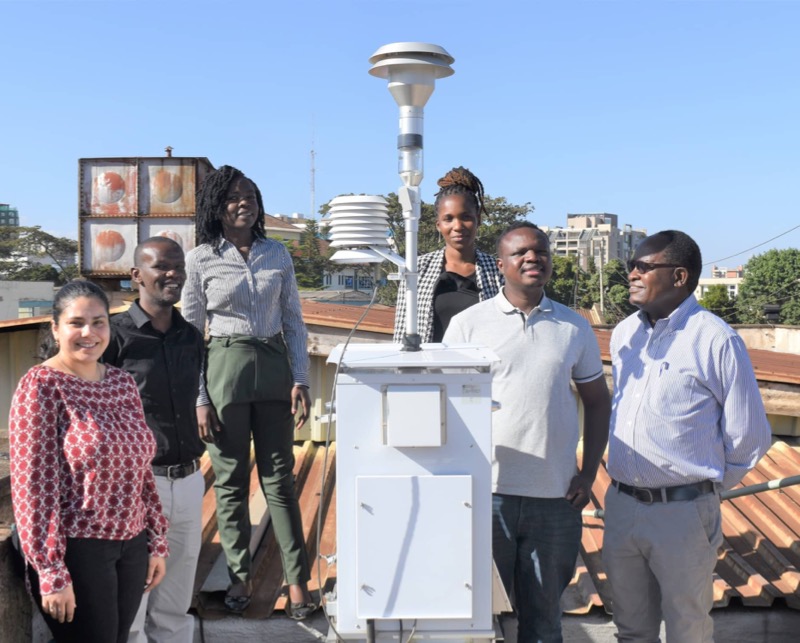
From left, HEI’s Pallavi Pant and Victor Nthusi with members of the Eastern Africa GEOHealth Hub research team at the University of Nairobi, Kenya: Beldine Okoth, Lydia Okolla, Noah Adera and Stephen Anyango. The team, led by Otienoh Oguge, has been collecting real-time air quality data in Nairobi as part of the project’s ongoing air pollution exposure assessment focusing on lung function and cognitive development in children.
HEI has also received funding from Open Philanthropy to conduct a study in India looking at changes in air quality as a result of the National Clean Air Programme launched in 2019. In addition, HEI recently hired a new India-based consultant to continue our work and oversee this new initiative.
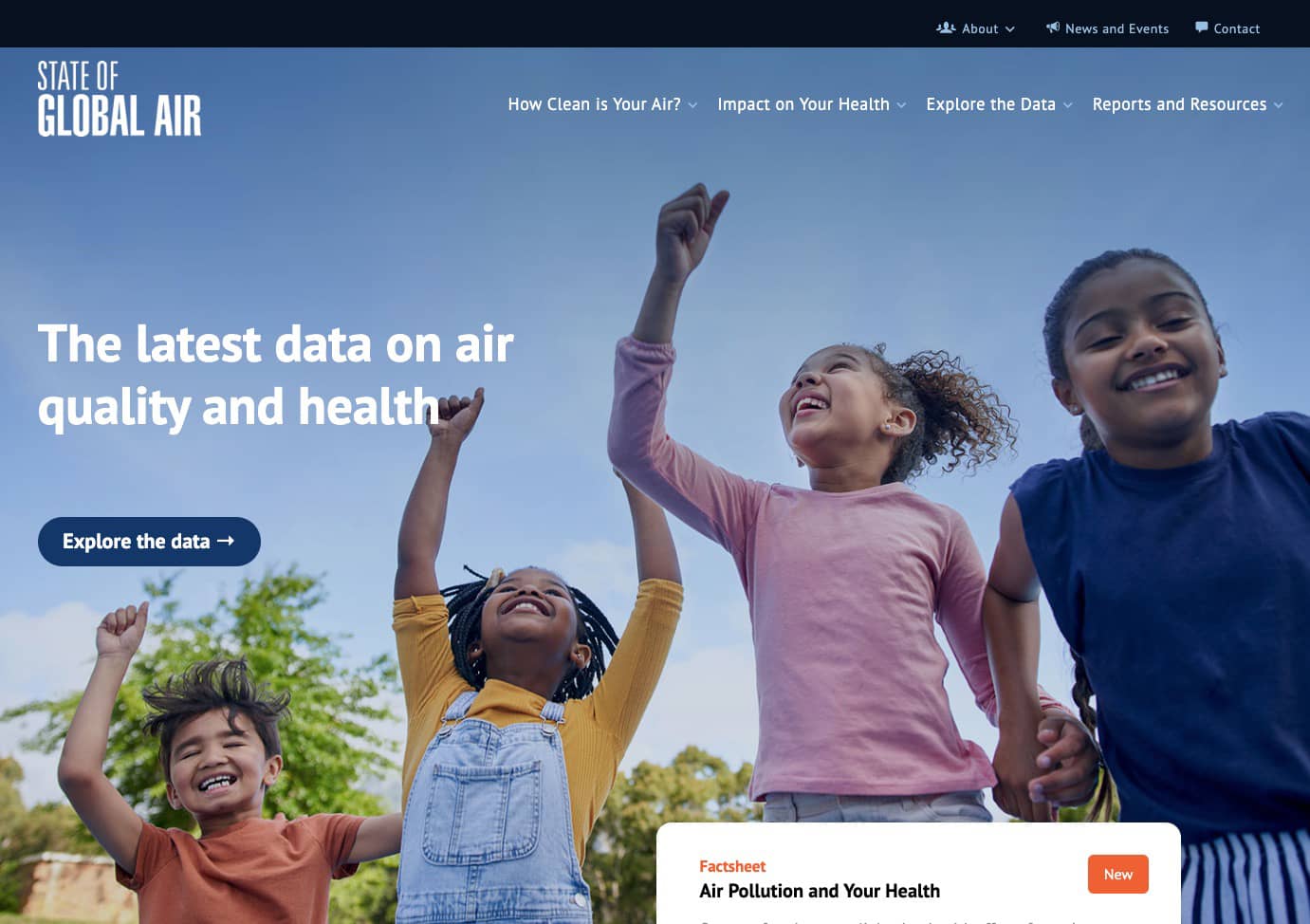
Our State of Global Air website has a new look, with improved navigation to access reports, resources, data tools, and informative pages on air pollution’s health impact around the world.
Throughout the year, HEI’s State of Global Air initiative released a variety of new Resources relevant to specific regions, including the European Union and South Asia, providing vital air quality and health information to areas that need it most. In addition, in November 2023, State of Global Air published a story map, Air Pollution and Health: The Global Impacts of Fossil Fuels. This innovative resource provides in-depth insights into the health impacts associated with exposure to air pollution from fossil fuel combustion, including the role of climate change in pollution’s severity, as well as a globally comparable dataset that allows for cross-country comparisons.
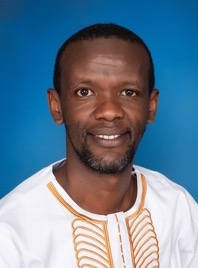
Victor Nthusi

Abinaya Sekar
HEI’s Global Health program now has two consulting research fellows. Victor Nthusi (left), based in Nairobi, Kenya, has worked for many years in environmental health and pollution control in low- and middle-income countries in Africa, Asia, and Latin America, and has extensive experience in environmental monitoring and policy evaluation. Abinaya Sekar joins us from Delhi, India, where she has worked with leading public policy think tanks to develop a framework for revising India’s National Ambient Air Quality Standards and for regulating air quality through a regional approach.
Global collaboration has always been important to HEI, and 2023 saw a marked expansion of our reach.

HEI’s Science on the 7th program brings together leading experts to discuss issues at the forefront of air quality and global health in lively 30-minute conversations. With over a dozen episodes to date, the series provides a platform for engaging with communities around the world on issues such as children’s health, decarbonization, air pollution and climate, gender disparities, the energy transition, and emerging challenges in global regions like Europe, Africa, and Latin America.
As HEI Energy expands, scientists and communities connect
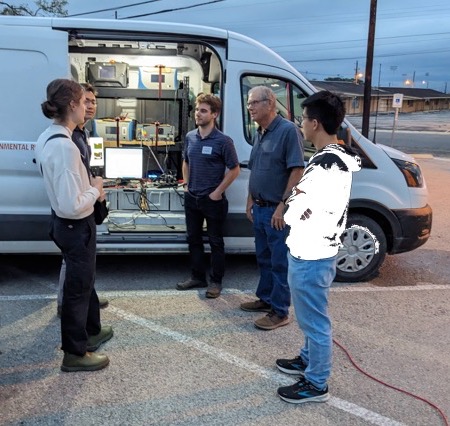
A research team led by Lea Hildebrandt-Ruiz of the University of Texas demonstrates mobile instrumentation to community members during their November 2023 public open house in the Eagle Ford Shale region.
The HEI Energy program advances impartial science on the potential community exposure and health effects associated with unconventional oil and gas development. Five initial studies, launched in 2022, are well underway with two nearing completion, and funding for four additional studies has been approved.
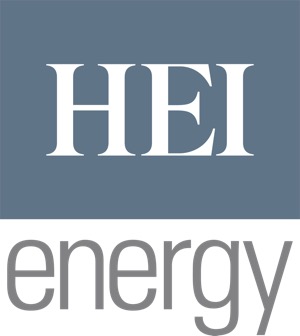
Progress at HEI Energy is reported regularly in quarterly updates, and all of the first five research teams shared their latest updates with poster presentations and recorded interviews during HEI’s 2023 Annual Conference in Boston.
Communities near unconventional oil and gas development operations have raised a number of concerns about their potential exposures and health effects associated with these activities. It is vital that any research in these topic areas is responsive to their needs and priorities. Toward this end, a series of in-person Community Open House events at several HEI Energy study locations gave residents a chance to meet the investigators and learn about the research underway.
At one such event, held in the North Front Range region of Colorado in August 2023, community members were invited to learn about potential noise and air pollution exposure from oil and gas development, see the equipment being used, ask questions, and share ideas and concerns. Similar events have been held in Loving, New Mexico, and the Eagle Ford Shale region of Texas.
Drawing upon lessons learned from previous community-engaged research on environmental exposures and health effects, HEI Energy hosted a webinar in the summer of 2023. Speakers shared three case studies on successful research collaborations between social scientists and environmental health scientists, providing valuable examples for others involved in similar interdisciplinary work.
In another webinar, held in December, HEI Energy investigators presented their research on potential groundwater contamination related to unconventional oil and gas development in Southwestern Pennsylvania. The team explained their interdisciplinary research approach involving geoscience and community engagement.
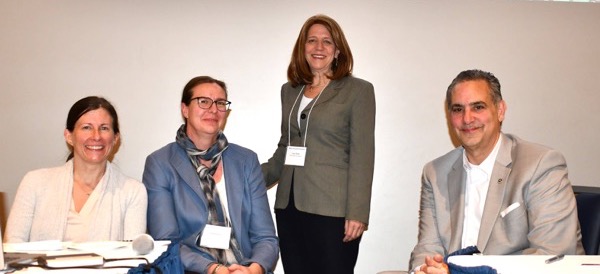
Jennifer Baka of Penn State University (left) with members of her research team and Richard Negrin, secretary of the Pennsylvania Department of Environmental Protection, at a Shale Network Workshop on environment and policy. Baka’s HEI Energy study is focusing on water quality.
HEI Energy’s initial round of funded studies are part of the Tracking Community Exposures and Releases (TRACER) Collaboration, which aims to understand community exposures to air emissions and noise from unconventional oil and gas development in the Denver-Julesburg region of Colorado, the Permian region of New Mexico, and the Eagle Ford Shale region of Texas. The Collaboration began in 2022 and will continue through 2024 so that investigators can see how levels of exposure vary over time and across seasons.
In January 2024, TRACER expanded its geographic reach to the Marcellus region, the country’s top dry shale gas-producing region (see US Energy Information Administration data), which lies under the Appalachian Basin. TRACER includes a research team, led by Lea Hildebrandt Ruiz of the University of Texas, Austin, that is uniquely positioned to expand its scope of research to the Marcellus region. The new work will dovetail with an existing research collaboration there that involves a separate industry-funded air quality monitoring program. TRACER is scheduled to wrap up in late 2024, with results presented at Community Open Houses in each study region early in 2025.
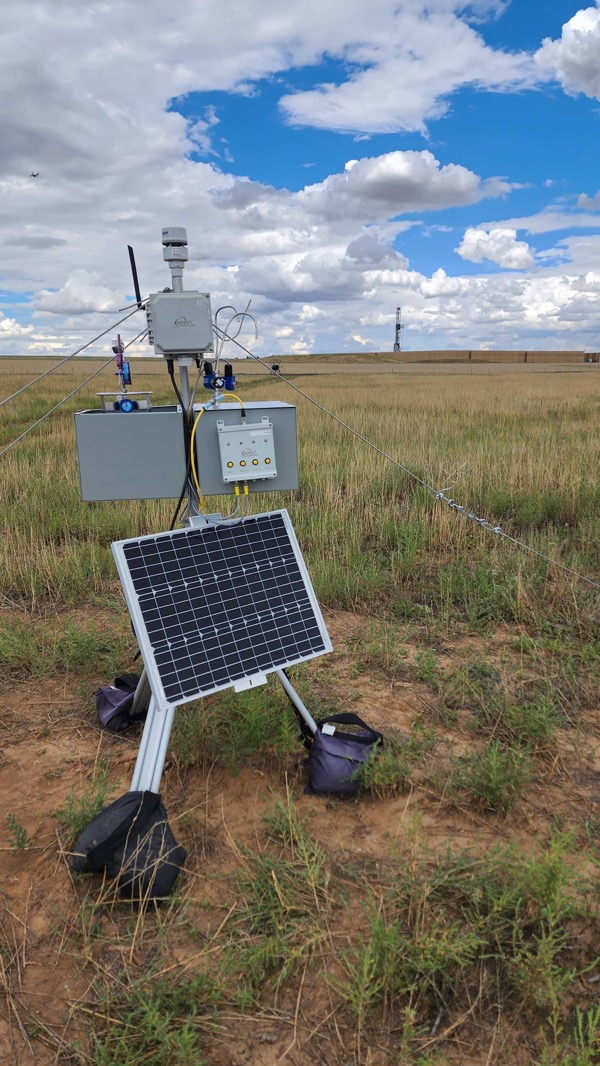
A detector stationed near a well pad in Colorado’s Denver-Julesburg Basin is monitoring air quality during drilling operations as part of a study led by Jeffrey Collett of Colorado State University.
In October 2023, HEI Energy released two Requests for Qualifications (RFQs) to pursue specific research ideas offered by Energy Research Committee members. With the RFQs, the committee sought qualified research teams to assess trends in air quality and community exposures associated with unconventional oil and gas development operations in one or more US regions, and conduct regional groundwater quality modeling to help understand how documented oil or gas spills from such operations might affect groundwater used as a source of drinking water in the Marcellus region.
Four research teams have been selected for funding and will be invited to present early work in posters at HEI’s 2024 Annual Conference along with HEI Energy-funded research teams who began their work in 2022 under the TRACER Collaboration.
| June 30, 2023 | June 30, 2022 | |||
|---|---|---|---|---|
| Assets | ||||
| Cash and cash equivalents | $2,348,832 | $6,454,725 | ||
| Restricted cash | 147,995 | 147,962 | ||
| Investments | 855.411 | — | ||
| Contributions and accounts receivable | 3,704,669 | 3,609,717 | ||
| Unbilled incurred costs on grants | 8,676,298 | 5,500,000 | ||
| Prepaid expenses | 18,291 | 43,788 | ||
| Office equipment, office furniture and fixtures, and leasehold improvements, net | 4,722 | 24,815 | ||
| Operating lease right-of-use assets | 994,044 | — | ||
| Total Assets | $16,750,262 | $15,781,007 |
| Liabilities and Net Assets | ||||
|---|---|---|---|---|
| Liabilities: | ||||
| Contracted research payables | $855,409 | $312,057 | ||
| Accrued contracted research | 3,010,791 | 2,769,329 | ||
| Deferred revenue | 263,799 | — | ||
| Deferred rent payable | — | 36,019 | ||
| Other accounts payable and accruals | 1,070,039 | 1,675,543 | ||
| Operating lease obligations | 991,052 | — | ||
| Total liabilities | 6,191,090 | 4,792,948 | ||
| Net Assets: | ||||
| Without donor restrictions | 1,835,662 | 722,041 | ||
| With donor restrictions | 8,723,510 | 10,266,018 | ||
| Total net assets | 10,559,172 | 10,988,059 | ||
| Total Liabilities and Net Assets | $16,750,262 | $15,781,007 |
| June 30, 2023 | June 30, 2022 | |||
|---|---|---|---|---|
| Revenues and support: | ||||
| EPA grants for the Health Effects of Air Pollution Program | $6,000,000 | $5,744,711 | ||
| EPA contracts for Energy Research | 3,530,214 | 3,421,866 | ||
| Industry contributions | 5,299,744 | 5,399,530 | ||
| Other non-federal grant and contract revenue | 50,153 | 449,080 | ||
| Other revenues | 103,707 | 65,798 | ||
| Total revenues and support | 14,983,818 | 15,080,985 | ||
| Expenses: | ||||
| Research programs: | ||||
| Research studies | 6,096,035 | 5,940,177 | ||
| Research planning and study selection | 720,746 | 642,306 | ||
| Scientific study management | 323,486 | 342,818 | ||
| Scientific study review | 353,050 | 300,276 | ||
| Scientific publication and communication | 1,364,274 | 1,153,281 | ||
| Total research programs | 8,857,591 | 8,378,858 | ||
| Special scientific projects: | ||||
| Energy research | 2,822,329 | 1,048,193 | ||
| Traffic studies review | 40,042 | 329,993 | ||
| Global health science | 1,009,428 | 1,042,768 | ||
| Total special scientific projects | 3,871,799 | 2,420,954 | ||
| Total research and scientific expenses | 12,729,390 | 10,799,812 | ||
| Administration | 2,683,315 | 2,316,313 | ||
| Total expenses | 15,412,705 | 13,116,125 | ||
| Net increase (decrease) in net assets | (428,887) | 1,964,860 | ||
| Net assets at beginning of year | 10,988,059 | 9,023,199 | ||
| Net assets at end of year | $10,559,172 | $10,988,059 |
The HEI Financial Statement and the Mayer Hoffman McCann P.C. Independent Auditors’ Report may be obtained by contacting Jacqueline C. Rutledge.
In mid-2023, I wrote to many of you about the exciting news that the HEI Board of Directors had selected Elena Craft as the Institute’s new president, following 29 years of exceptional growth and progress under Dan Greenbaum. I am pleased to say that barely six months after her start, Elena’s vibrant leadership and vision for HEI have already taken hold.
Nowhere is Elena’s leadership more apparent than in fostering an entrepreneurial responsiveness among staff to produce independent science to meet the emerging challenges faced by HEI’s government and industry sponsors as they work to develop new fuels and technologies, promulgate effective regulations when needed, and make health-based energy choices to meet the daunting challenges of the energy transition.
I am especially pleased to report that as part of the process of introducing Elena to the HEI community, I had the privilege of meeting with senior leaders from both industry and government that sponsor HEI. In addition to sharing the Board’s leadership decision, I also took the opportunity to ask for honest feedback on HEI’s past and current performance, and importantly, on how the Institute might best contribute in the coming years. I greatly enjoyed these personal conversations and was gratified to hear that HEI and the science we provide continue to be held in such high regard. Examples included studies that have informed national air quality standards, tracked progress made in reducing vehicle emissions while new gaps in knowledge were identified, and assessed the effectiveness of environmental regulations in improving public health, especially in historically disadvantaged communities.
I also heard about many opportunities that lie ahead for HEI to provide trusted and responsive science as its mission evolves to meet the needs of our sponsors and our stakeholder communities in the coming years. These opportunities, primarily driven by the broader need to decarbonize and compete in a global marketplace, begin with upstream energy production and extend through end stage carbon capture, including full battery, electric, hydrogen, and other new technologies and fuels that are still emerging. For the first time the larger energy transition will require HEI to not only respond to known questions around exposures and health effects, but anticipate questions that may arise around emerging technologies and provide trusted science that minimizes risk from unintended consequences associated with these technologies. Finally, in looking ahead, we must continue to be mindful of the remaining unfinished business around emissions and exposures from legacy sources fueled by fossil fuel combustion and the communities that may be impacted.
As HEI looks to the future, I am confident that under the leadership of President Craft and her team, HEI’s unique role in bringing diverse stakeholders together to identify key questions and respond to those questions with impactful science will continue and grow. As always, the Board of Directors and all of us at HEI are grateful for the ongoing support from our many sponsors in government, industry, and global philanthropy.
Yours,

Richard A. Meserve
Chair, HEI Board of Directors
As we reflect on a year of growth and transition, it is with great pride that we share HEI's achievements in advancing Science in Service to Community, the theme of this report.
Operating at the nexus of science and policy, HEI remains a steadfastly neutral and trusted broker in funding research that informs discourse on impactful public health policies around the world. In the United States, the Environmental Protection Agency has strengthened the air quality standard for fine particulate matter (PM), based in part on HEI-funded research. And in Europe, findings from our work on health implications of exposure to low PM concentrations have informed decisions by the European Council and the European Parliament, which in early 2024 reached a provisional political agreement on toughening the Ambient Air Quality Directive.
In the HEI Energy program, our community exposure research has begun delivering results that can inform health-protective decisions about oil and gas development. As research continues, we expect further impacts across the broader energy transition. We’re also planning for the design of a cumulative impact assessment that can help jump-start assessments for communities that may be impacted by oil and gas operations. Other aspects of our ambitious Energy program portfolio include ongoing “Energy & Health” webinars and participating in regional decarbonization efforts, along with hosting workshops and activities that foster collaboration among HEI staff, researchers, and communities.
HEI’s Global Health program has continued gaining momentum as well, with new work in East Africa, where researchers and practitioners have convened and launched a review of current evidence on air pollution and health. In India, we’ve begun a program funding new regional “accountability” studies, which examine how effectively air pollution policies achieve air quality goals. At the same time, our State of Global Air report continues to inform policymakers and citizens around the world with detailed information on regional sources and health implications of air pollution.
HEI’s new Environmental Justice program released its first RFA in July 2023 to explore how air quality policies, actions, or interventions have helped or hurt marginalized communities in the United States. The first funded research projects are expected to be underway later this year.
HEI-funded investigators have been evaluating the effectiveness of diesel school bus replacement programs and transportation and energy policies in reducing emissions and improving human health. They have also been researching factors that influence exposure and identifying approaches to improve exposure assessment. In addition, the first of five HEI-funded studies examining the relationship between air pollution exposure and incidence and severity of COVID-19 infections was released in November 2023.
HEI has approved funding for several studies that will evaluate exposure to and health effects of traffic-related air pollutants as fuels and technologies change, the fleet turns over, and electrification makes greater inroads. These contributions will no doubt provide valuable insights in understanding the complex nature of air pollution in the context of other stressors.
As we look toward an ambitious year ahead, including developing a new five-year strategic plan, I am eager to continue HEI’s legacy of providing the highest quality impartial science to support a cleaner environment, a thriving economy, and healthier communities.
Yours,

Elena Craft
HEI President
We would like to thank all the reviewers who offered their time and expertise to HEI and provided thoughtful and high-quality comments and feedback on our various projects. We also thank our quality assurance audit teams, our Research Committee, Review Committee, Global Health Oversight Committee, Environmental Justice Advisory Council, Environmental Justice Oversight Panel, and the Exposure Studies Review Panel. We would not succeed without the help of all these individuals.
Adam Szpiro, University of Washington
Alison Heppenstall, University of Glasgow, Scotland
Amanda Szabo-Reed, University of Kansas
Amie Lund, University of North Texas
Andreas Neophytou, Colorado State University
Antony Chen, University of Nevada, Las Vegas
Ben Barratt, Imperial College London, UK
Cathryn Tonne, Barcelona Institute for Global Health (ISGlobal), Spain
Claudia Persico, American University
Dan Rainham, Dalhousie University, Canada
Daniel Tong, George Mason University
Edmund Seto, University of Washington
Elena Colicino, Icahn School of Medicine Mount Sinai
Eric Lavigne, Health Canada/University of Ottawa, Canada
Erik Lebret, Utrecht University and National Institute of Public Health and the Environment, Netherlands
Hind Sbihi, University of British Columbia, Canada
Howard Chang, Emory University
Jeff Goldsmith, Columbia University
Jennifer Bobb, Kaiser Permanente
Joerg Schweizer, University of Bologna, Italy
John Gulliver, St. George's University of London, UK
Kayleigh Keller, Colorado State University
Kim Cecil, Cincinnati Children’s Hospital Medical Center
Marcus Cooke, University of South Florida
Marie-Abele Bind, Harvard University
Marloes Eeftens, Swiss Tropical Health Institute, Switzerland
Megan Herting, University of Southern California
Meng Wang, University of Buffalo, SUNY
Nicole Gatto, University of Southern California
Pamela Ohman-Strickland, Rutgers University
Paul Villeneuve, Carleton University, Canada
Peter James, Harvard University
Rachel Nethery, Harvard University
Randall Martin, Washington University of St Louis
Sandrah Eckel, University of Southern California
Susan Anenberg, George Washington University
Zhanghua Chen, University of Southern California
Alex Nyabakira, Kampala Capital City Authority, Uganda
Anumita Roy Chowdhury, Centre for Science and Environment, India
Bertrand Tchanche, Alioune Diop University, Senegal
Brikesh Singh, Asar Social Impact, India
Doroti Cuestas Bernuy, Peru
Egide Kalisa, University of Western Ontario
Elizabet Paunovic, Serbia
Erin McDuffie, US Environmental Protection Agency
Jess Beagley, Global Climate and Health Alliance, UK
Kanyiva Muindi, African Population and Health Research Centre, Kenya
Laura Andrea Rodriguez, Universidad Industrial de Santander UIS, Colombia
Patrick Katoto, University of Cape Town
Rebecca Garland, University of Pretoria, South Africa
Rebecca Nantanda, Makerere University Lung Institute, Uganda
Robert Mbiake, University of Douala, Cameroon
Sarath Guttikunda, Urban Emissions, India
Sunil Dahiya, Centre for Research on Energy and Clean Air, India
Yasmine Yau and Nina Renshaw, Clean Air Fund, UK
